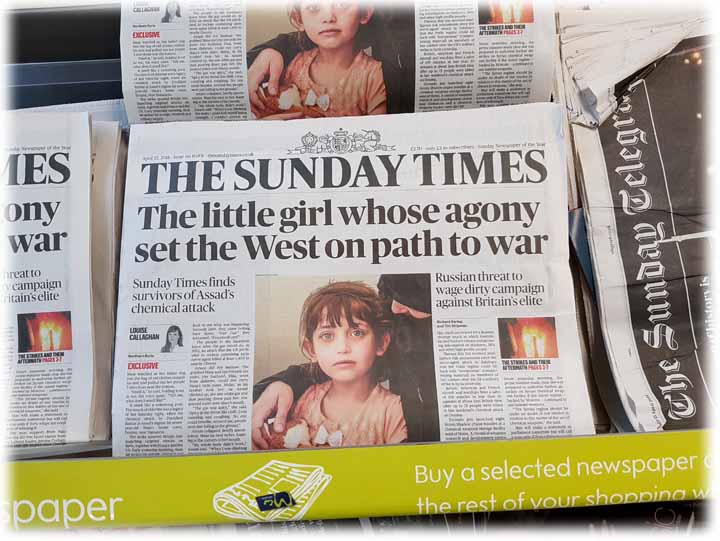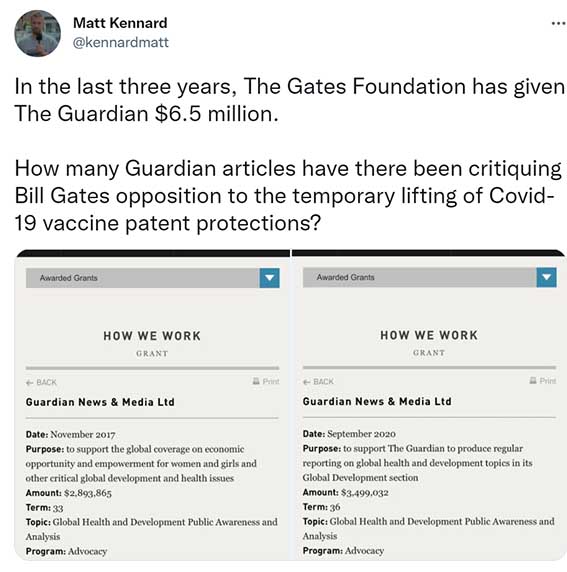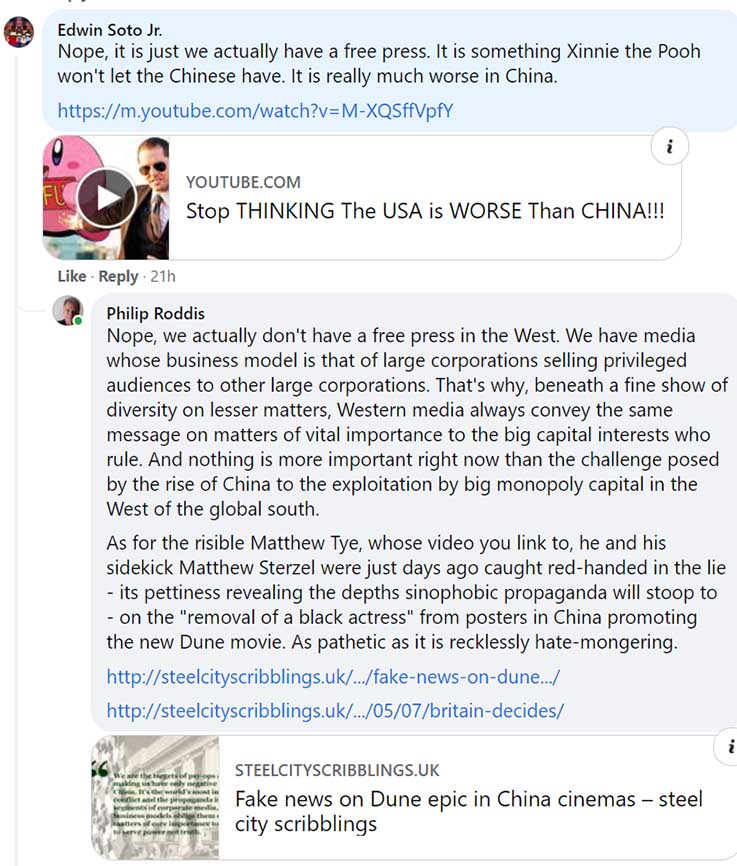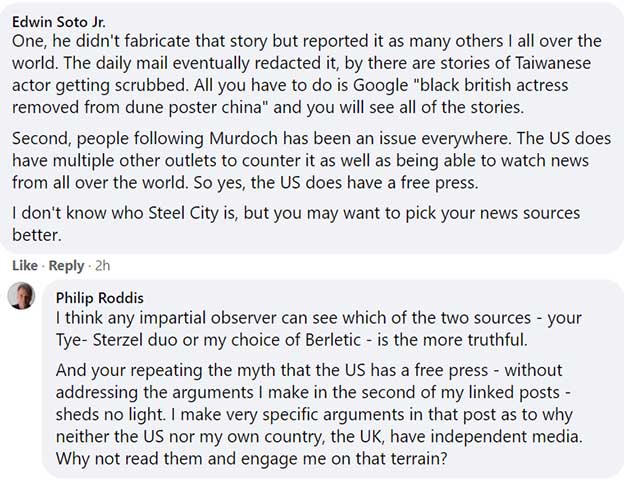Sunday Times owner Rupert Murdoch sits on the board of Genie Energy: conducting oil drilling in Syria’s Golan Heights, contrary to international law on exploiting an occupied territory’s resources. See this post
One of the most important of capitalism’s ideological successes is its implanting of the notion, largely uncontested, that if a state does not directly control its news and current affairs media, or important sections of the same, those media are by that fact independent.
Blessed are the citizens, the refrain goes, of countries in which Freedom Of The Press is a non negotiable core value. And truly benighted, goes the corollary, are those whose misfortune it is to live in states – usually states which either challenge capitalism itself or in some way obstruct the designs of its most predatory practitioners – where media are under government control.
WE have access to reliable information from outlets whose opinionators and fact-finders regard delivery of the truth, the whole truth and nothing but the truth as a sacred and binding duty.
THEY do not.
This cosy belief is easily punctured in principle, but in practice rarely is. First and most obvious, many of the planet’s most widely consumed media are owned by a handful of plutocrats – the Barclay Brothers, Murdoch, Rothermere et al. Our ruling class is by no means confined to media barons, but let me put this question to those whose eyes roll skyways at my frequent use of the very term, ruling class:
Whether you live in America, Australia, Britain or other Western state, do you suppose your opinion is as influential on your government’s decisions as that of Rupert Murdoch?
[ezcol_1half] [/ezcol_1half] [ezcol_1half_end]
[/ezcol_1half] [ezcol_1half_end]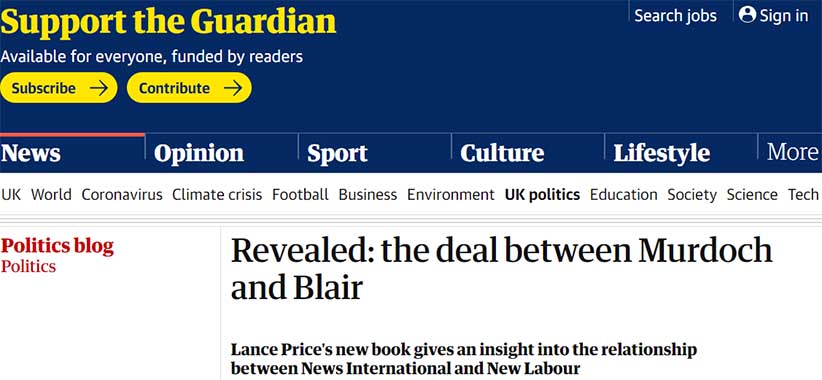
Click on either image to access the full article.[/ezcol_1half_end]
Both of the above are from the Guardian. There’s a reason for that, and it takes me to a second truth about “our independent media”. The Guardian makes much of the fact it is not owned by a wealthy individual. Its centrist and leftist voices are united in reminding us of this, with Monbiot and Owen Jones no less assertive on the point than Freedland or Polly Toynbee.
And they are right. But what is ignored is that second and more insidious truth, as applicable to Guardian and other non oligarch media as it is to Telegraph, Sun and Mail. All have a business model crucially dependent on advertising revenue. As Noam Chomsky put it:
Our media are large corporations selling privileged audiences to other large corporations. Now the question is: what pictures of the world would a rational person expect from this?
So a fine piece by George Monbiot on eco-madness – and to be clear, I do welcome his rising willingness to link this to Capital’s intrinsic laws of motion 1 – can appear next to ads for new cars and exotic holiday destinations. But why do I regard ad dependency as a subversion – of media allegiance to truth – more insidious than oligarchic ownership?
Because it slips under the radar. “A snake”, Vice-President Johnson is said to have declared, on hearing that JFK had a spy in his inner circle, “is only dangerous when you don’t know it’s there.”
That’s a limited analogy. Most of us hold highly idealised views – isn’t this what Asch, Milgram and Zimbardo showed us? – of our capacity for independent thought. As with advertising, we sorely underestimate the subliminal influence of media on opinions we fondly believe we came to under our own steam in the spirit, quintessentially bourgeois, of Sinatra’s My Way.
Sure guys. Persistent campaigns to deliberately manipulate people’s minds using mass media has no effect on their decisions at all. I guess that’s why that whole “advertising” fad never made any money. Caitlin Johnstone
All the same, the biases of Murdoch’s Sun or the Barclay Brothers’ Telegraph are more widely appreciated than those arising from the need to keep advertisers, and in the Guardian’s case wealthy donors, sweet. That’s one reason I so often have the Guardian in my sights ….
For more on Bill Gates’ calculated largesse, see the third of my three autumn reads
… another reason being its mealy mouthed hypocrisy.
A fuller exposition of these arguments, the case of the BBC also considered, is given in a post written in May this year, Britain decides. For now though I’ll finish with an exchange yesterday on FB, below a Nikkei Asia alert to a feature by William Bratton, author of China’s Rise, Asia’s Decline, and a former head of Asian equity research at HSBC.
Before I get to that exchange, let me reiterate a point I’ve made before. In the cold but scarily warming war on China, Western propaganda is delivered on many fronts, from Xinjiang and Taiwan to the bathos of the Dune Poster lie. 2 Another, longstanding but moved from back burner to front in the wake of Evergrande, is a concerted talking down of China’s economy by financial/business organs and to lesser extent the ‘quality’ end of more general media.
Bratton’s title and opening paragraphs show him as buying none of it.
What China’s economic permabears keep getting wrong
For those warning us about the perils of China’s debt-fueled growth, it is easy to see the recent bond defaults by Evergrande and Fantasia as the country’s Minsky moment, 3 when asset prices collapse after an extended period of growth.
From their perspective, fears over unsustainable debt levels have now been proven with potentially catastrophic consequences. As such, China’s hopes of challenging the U.S. as the world’s largest economy have been firmly kicked into the long grass.
If only it were so simple, especially as we have been here so many times before. In fact, every stage of China’s rapid rise has been accompanied by a chorus of Western critics who appear either unable or unwilling to believe that its model of development could be successful.
They have instead continually searched for flaws that, they hoped, would either slow the country’s economic growth or lead to a USSR-style collapse …
And here’s a snatch of the Facebook exchanges it inspired. I usually refrain from engaging, the general tone being mostly ignorant and irrational – itself an antidote to the idea of a West well informed by media whose first loyalty is to truth – and frequently nasty with it. Engagement can feel like shooting midges with an air rifle.
But occasionally – out of cussedness or for the practice or because I sense a wider aspect that might inspire a steel city scribbling – I hold nose and jump on in. This was one such time.
I didn’t respond to Mr Soto Jr’s reference to the Mail’s ‘redaction’: a highfalutin euphemism for the posting of a hit piece then, on learning through the grapevine of its falsity – which a phone call by a journalist doing her job, and asking for photos of China’s lit up billboards showing the allegedly doctored image, could have established in minutes – silently pulling it. Not so much hit-and-run as hit, run and clean up the crime scene.
Nor did I point to the absurdity of that challenge to “google ‘black british actress …'” – to do so would only throw up endless recyclings of one and the same lie.
(This, incidentally, is why people are so easily taken in by stories – the “Uighur genocide” is a textbook case – whose wide distribution across diverse media, each outlet citing the others in a Ponzi of circularity, obscures the fact of a single and highly untrustworthy source.)
Nor yet did I point out to Mr Soto Jnr that, as shown beyond doubt by the Berletic take-down, Matthew Tye’s part in the smear was by no means confined to his having “reported the story as many others all over the world [did]”.
Like I said, shooting midges with an air rifle. With many more ways of refuting Mr Soto Jr’s self congratulatory drivel than I had either time or energy for, I was content with the ones I chose. His response? Other than raiding FB’s emoticon library –“I-guffaw-inanely-at-you” – none.
I await his closely reasoned rebuttal of the points made in Britain decides with less than bated breath. Tick fucking tock.
* * *
- As it happens, the day this post was written, an excellent piece by George Monbiot appeared in the Guardian. First five words of its title? Capitalism is killing the planet. I really do appreciate his tendency, which I’ve seen grow over the past few years, to do what too few ‘greens’ do: shift the focus from individual behaviours to the inescapable consequences of a system which must prioritise profits over planet. It’s a shame this intelligent and articulate man fails to see that the same logic, and not abuses real or alleged by Bashar al-Assad, is what drives the West’s antipathy to Damascus. In this he is, like many and probably most journalists, less the conscious propagandiser than credulous victim of the same. Not that this lets him off the hook, or mitigates the fact his role at the Guardian is to draw in the more left-inclined of its green liberal market and, as with Owen Jones, give left cover to his empire cheer-leading employer.
- Yet another front in the propaganda war are the allegations of Belt & Road as a trojan horse for forcing the global south in general, and resource rich Africa in particular, into debt defaults so Chinese creditors can grab assets. If true that would be a case of pot calling kettle black, this having long been an explicit goal of IMF and World Bank loans. In fact it does not bear empirical scrutiny but that is no more likely to see off the allegations than the debunking of a “Uighur genocide” (or Douma “chemical attack by Assad”) has seen an end to those accusations. All are too useful, and since our media lie by omission even more than by commission, disproven allegations continue to be aired.
- Investopedia defines a Minsky moment as “the onset of a market collapse brought on by the reckless speculative activity that defines an unsustainable bullish period … [it is] named after economist Hyman Minsky, and defines the point in time where the sudden decline in market sentiment inevitably leads to a market crash.” Given this, it is naive to think that talking down of China’s economy mere wishful thinking, the way a football team’s supporters reassure one another by overstating the flaws of a rival side before a coming fixture. The key is in the causal link between a “decline in market sentiment” and a “market crash”. Those outpourings from Business Insider, Economist, WSJ etc are aimed, among other target audiences, at small to medium – and in some cases large – investors drawn to the opportunities of Belt & Road. This psychological, self-fulfilling-prophecy basis of capitalist markets is one driver of an inbuilt tendency to chaos. (A core media task being to present said chaos as more akin to Acts of God – weather metaphors are much favoured – than to inevitable consequences of wealth creation driven by market forces and private profit rather than rational planning by and for humankind.) More to the point here, it is why the talking down I speak of is not just wishful thinking. Nor is it just propaganda. It is an attack whose intent is to effect real world change in the shape of a bear market.

